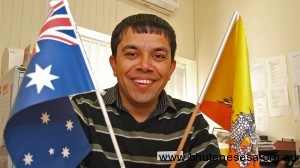By Brett Williamson (ABC/Adelaide)
After 17 years in a refugee village in Nepal, Sushil Niroula has finally found a new home, and will proudly take the oath to become an Australian citizen this Sunday.

Sushil’s life began in the foothills of the Himalayas.
Growing up in a market village in Southern Bhutan, he enjoyed playing in the local forests and until around the age of 13 led the innocent, carefree life of a child.
With two older and one younger brother and one sister, parented by a single mother due to the early death of his father, Sushil’s family lived in a large house in Gola Bazar, with several of the rooms rented out.
The income provided the family with a comfortable lifestyle.
Sushil remembers the time around his seventh year in schooling as a time of great change.
During the mid 80s, the Royal Government of Bhutan introduced a unification measure, described as a ‘one nation, one people’ policy.
The multicultural population of the country was asked to adopt a national cultural dress, religious beliefs and customs.
“Socially, culturally, religiously, ethnically, everything in every aspect of life, they wanted the people of Bhutan to look [as] one,” Sushil said.
Bhutan was made up of three primary cultures from Tibet, Nepal, and India and Burma.
The Royal family’s origins stemmed from Tibet.
Sushil’s ancestors had settled in Bhutan, from Nepal, in the 1600s.
“The ruling class wanted to impose their ideas, their laws, their culture,” he explained.
Southern Bhutanese communities began to hold public meetings to protest the changes.
Soon after the protests began Sushil’s brother began to attend the meetings.
Sushil said his brother was threatened and forced to leave the country.
“When my brother left the country, my family became targeted.”
A spate of similar occurrences followed that Sushil considered ‘ethnic cleansing’.
He and his mother began to receive nightly visits from the government’s police and army, encouraging them to follow his brother and leave Bhutan.
Original Story: ABC


A tiring journey of life